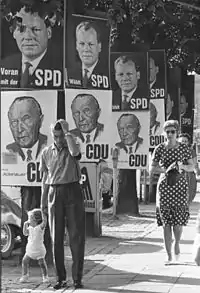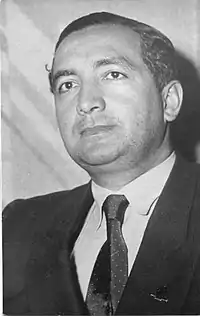1961 West German federal election
Federal elections were held in West Germany on 17 September 1961 to elect the members of the fourth Bundestag. CDU/CSU remained the largest faction, while the Social Democratic Party narrowly became the largest individual party in the Bundestag, winning 203 of the 521 seats.
| |||||||||||||||||||||||||||||||||||||||||||||
All 521 seats in the Bundestag 261 seats needed for a majority | |||||||||||||||||||||||||||||||||||||||||||||
|---|---|---|---|---|---|---|---|---|---|---|---|---|---|---|---|---|---|---|---|---|---|---|---|---|---|---|---|---|---|---|---|---|---|---|---|---|---|---|---|---|---|---|---|---|---|
| Registered | 37,440,715 | ||||||||||||||||||||||||||||||||||||||||||||
| Turnout | 32,849,624 (87.7%)[2] | ||||||||||||||||||||||||||||||||||||||||||||
| |||||||||||||||||||||||||||||||||||||||||||||
 Results by constituency for the first votes. Grey denotes seats won by the CDU/CSU; red denotes seats won by the SPD. | |||||||||||||||||||||||||||||||||||||||||||||
| |||||||||||||||||||||||||||||||||||||||||||||
Campaign

For the first time, the SPD announced a Chancellor candidate who was not chairman of the party: Willy Brandt, the Governing Mayor of West Berlin. After the building of the Berlin Wall, he gained more and more sympathy, while chancellor Konrad Adenauer was criticised for not showing enough support for the people of West Berlin. Adenauer had to save the absolute majority of CDU and CSU, but, considering his age and his long term as chancellor, there were big doubts if he should lead the country in a fourth term.
Results
 | ||||||||||||||||
| Parties | Constituency | Party list | Total seats | |||||||||||||
|---|---|---|---|---|---|---|---|---|---|---|---|---|---|---|---|---|
| Votes | % | +/− | Seats | +/− | Votes | % | +/− | Seats | +/− | Seats† | +/− | % | ||||
| Social Democratic Party (SPD) | 11,672,057 | 36.5 | +4.5 | 91 | +45 | 11,427,355 | 36.2 | +4.4 | 99 | −24 | 203 | +22 | 39.0 | |||
| Christian Democratic Union (CDU) | 11,622,995 | 36.3 | −3.4 | 114 | −33 | 11,283,901 | 35.8 | −3.9 | 78 | +10 | 201 | −21 | 38.6 | |||
| Free Democratic Party (FDP) | 3,866,269 | 12.1 | +4.6 | 0 | −1 | 4,028,766 | 12.8 | +5.1 | 67 | +27 | 67 | +23 | 12.9 | |||
| Christian Social Union (CSU) | 3,104,742 | 9.7 | −0.9 | 42 | −5 | 3,014,471 | 9.6 | −0.9 | 8 | ±0 | 50 | −5 | 9.6 | |||
| All-German Party (GDP)‡ | 859,290 | 2.7 | −5.2 | 0 | −6 | 870,756 | 2.8 | −5.2 | 0 | −11 | 0 | −17 | 0 | |||
| German Peace Union (DFU) | 587,488 | 1.8 | +1.8 | 0 | ±0 | 609,918 | 1.9 | +1.9 | 0 | ±0 | 0 | ±0 | 0 | |||
| German Reich Party (DRP) | 242,649 | 0.8 | −0.2 | 0 | ±0 | 262,977 | 0.8 | −0.2 | 0 | ±0 | 0 | ±0 | 0 | |||
| South Schleswig Voter Federation (SSW) | 24,951 | 0.1 | ±0 | 0 | ±0 | 25,449 | 0.1 | ±0 | 0 | ±0 | 0 | ±0 | 0 | |||
| German Community (DG) | 21,083 | 0.1 | ±0 | 0 | ±0 | 27,308 | 0.1 | ±0 | 0 | ±0 | 0 | ±0 | 0 | |||
| Electoral Group for a Neutral Germany (WGnD) | 778 | 0.0 | +0.0 | 0 | ±0 | – | – | – | – | – | 0 | ±0 | 0 | |||
| Electoral groups and independents | 2,164 | 0.0 | ±0 | 0 | ±0 | – | – | – | – | – | 0 | ±0 | 0 | |||
| Invalid/blank votes | 845,158 | — | — | — | — | 1,298,723 | — | — | — | — | — | — | — | |||
| Totals | 32,849,624 | 100 | ±0.0 | 247 | ±0 | 32,849,624 | 100 | ±0.0 | 252 | +2 | 521 | +2 | ±0 | |||
| Registered voters/turnout | 37,440,715 | 87.7 | — | — | — | 37,440,715 | 87.7 | — | — | — | — | — | — | |||
| Source: Federal Returning Officer | ||||||||||||||||
- ^† — includes the non-voting delegates for West Berlin (13 SPD, 9 CDU).
- ^‡ — merger of the German Party and the All-German Bloc/League of Expellees and Deprived of Rights.
| 251 | 67 | 203 |
| CDU/CSU | FDP | SPD |
 Seat results—SPD in red, FDP in yellow, CDU/CSU in black, others (moderate right) in gray
Seat results—SPD in red, FDP in yellow, CDU/CSU in black, others (moderate right) in gray
Aftermath
The absolute majority was lost by the conservative union due to the gains of the liberal FDP under Erich Mende. From 1961 on, the Union, SPD and FDP established an electoral "triopoly" in the Bundestag that would last until 1983.
Konrad Adenauer remained Chancellor, building a coalition between the CDU/CSU-FDP. In 1962 he had to announce a fifth cabinet: The FDP had temporarily left the coalition after the secretary of defense, Franz Josef Strauß (CSU), had ordered the arrest of five journalists for publishing a memo detailing alleged weaknesses in the German armed forces (known as the Spiegel scandal). In 1963 Adenauer finally resigned; Ludwig Erhard took over his position as head of the coalition and government.
Further reading
- Barnes, Samuel H.; Grace, Frank; Pollock, James K.; Sperlich, Peter W. (1962). "The German Party System and the 1961 Federal Election". American Political Science Review. 56 (4): 899–914. doi:10.2307/1952792.
References
- "Wahl zum 4. Deutschen Bundestag am 17. September 1961" (in German). Bundeswahlleiter. Archived from the original on 6 May 2012. Retrieved 6 May 2012.
- "Voter turnout by election year". Website of the Federal Returning Officer's Office. The Federal Returning Officer. Archived from the original on 7 November 2014. Retrieved 7 November 2014.
.jpg.webp)


